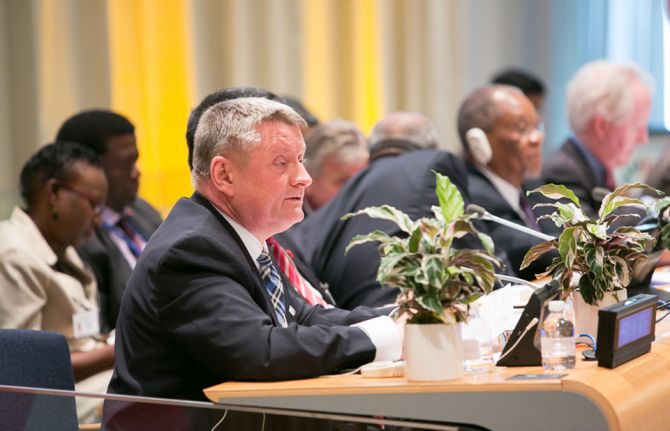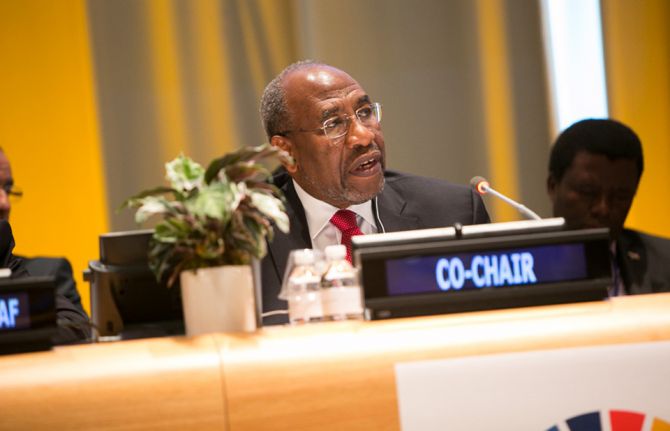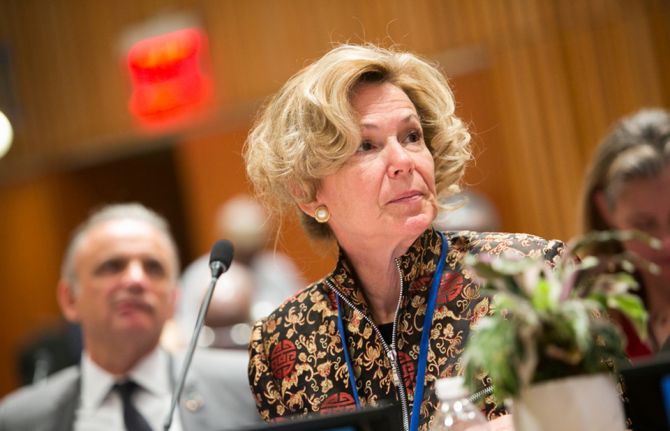




Update
Getting ahead of the looming treatment crisis: an action agenda for reaching 90–90–90
09 June 2016
09 June 2016 09 June 2016The key question of how the impending crisis in HIV treatment should be addressed dominated a panel meeting entitled “Getting ahead of the looming treatment crisis: an action agenda for reaching 90–90–90,” which met on 9 June at the United Nations General Assembly High-Level Meeting on Ending AIDS, being held from 8 to 10 June in New York, United States of America.
The panel discussion focused on the imperative of achieving the global 90–90–90 treatment target, whereby 90% of people living with HIV know their status, 90% of people who know their HIV-positive status are accessing treatment and 90% of people on treatment have a suppressed viral load.
Although such targets are realistic and achievable, the panel members argued that there is still a long way to go. Despite tremendous gains in treatment coverage, the current level is not sufficient to prevent the epidemic from rebounding in many countries.
A number of issues were cited, including the fact that half of all people living with HIV are unaware of their status and therefore not on treatment; given this figure, the number of people accessing antiretroviral therapy is expected to approximately double over the next five years. The sustainability of the supply of affordable antiretroviral medicines is uncertain, with new, more expensive, second- and third-line regimens becoming increasingly necessary. In addition, the generic market is concentrated among too few producers, which may have implications for sustainability.
The panel members suggested a range of recommendations to avert the looming treatment crisis. They stressed that the next phase of the AIDS response had to recognize new realities, such as rising migration and conflict, competing health and development issues and changing donor priorities.
Front-loading AIDS funding over the next five years was also advocated, with resources needed for ending the epidemic peaking at US$ 26.2 billion in 2020. Treatment must become more widely available and countries should support the development, production and delivery of high-quality medicines, using the Agreement on Trade-Related Aspects of Intellectual Property Rights (TRIPS Agreement) to create generics. Treatment delivery also needs to be broadened, with greater decentralization (such as community-based service delivery) and better access to viral load monitoring, the panel noted.
The need for low- and middle-income countries to increase their domestic funding was also raised, along with the role of the international community in lending its support where necessary to reach the 90–90–90 treatment target as a sound investment for global health and sustainable development.
During her remarks in the panel session, the United States Global AIDS Ambassador, Deborah Birx, announced a new US$ 100 million investment fund for key populations. Noting that although the 90–90–90 treatment target applies to everyone, to ensure access to all, the United States of America, through the President's Emergency Plan for AIDS Relief, would be taking action to ensure 90–90–90 for key populations. The new fund will support innovative, tailored, key population-led approaches to expand access to proven HIV prevention and treatment services so that the words “no one left behind” are translated into emergency action today.
Quotes
“I think we are all in agreement that the world is at an important turning point in the AIDS response. The current level of HIV treatment coverage is cup half-full and not sufficient to prevent the large number of AIDS-related deaths and to prevent the epidemic from rebounding in many countries. There must be a further massive scale-up in the provision of antiretroviral therapy, and this scale-up needs to happen as fast as possible.”
“Countries need to fully leverage their negotiating potential, including for pooled procurement, voluntary licensing mechanisms and/or other TRIPS Agreement (Agreement on Trade-Related Aspects of Intellectual Property Rights) flexibilities. Countries will have an increasing number of people on lifelong treatment. They need to intensify their efforts to rethink, scale and smarten the delivery of antiretroviral therapy.”
“Our government is committed that generic medicines for HIV will be available to all those who need it. India shall remain committed to the Doha Declaration on the TRIPS Agreement (Agreement on Trade-Related Aspects of Intellectual Property Rights) and Public Health. I don’t think there could be a clearer declaration of our policy.”
“Not all the news is good. In our region, most bilaterals have stopped financing. If this continues, it will become a true catastrophe. Without help, not only we will not be able to achieve 90–90–90, but those on HIV treatment will be taking obsolete medications. The Middle East and North Africa needs solidarity and needs it more than any region in the world.”



